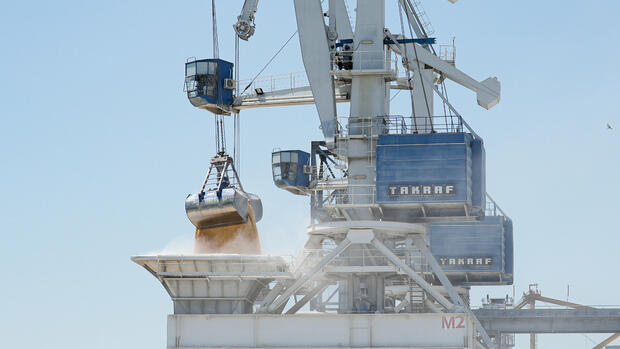Geneva, Riga, Brussels After the end of the grain deal with Ukraine, Russia is stepping up its threats. Since Thursday, the Kremlin has considered all ships calling at Ukrainian ports as military targets.
Western countries are expecting attacks on freighters after the Russian army bombed grain stores in the Ukrainian port city of Odessa in recent nights. “The route across the Black Sea is unsafe,” a senior EU official told Handelsblatt. Russia has already shown last year that it does not shy away from sinking smaller transport ships.
A spokesman for the US National Security Council said Russia had laid additional sea mines off Ukrainian ports. The Kremlin wants to justify attacks on civilian ships and blame Ukraine. The British Ministry of Defense expects the Russian Black Sea Fleet to play “a more active role” from now on.
The government in Kiev is now working with the EU to reduce the risk of Russian attacks by redirecting its exports. According to EU data, only 40 percent of Ukraine’s grain is exported via its own ports on the Black Sea. 60 percent are brought to the EU by land and shipped from there via ports on the Baltic Sea, the Adriatic Sea and other ports on the Black Sea, such as Constanta in Romania.
Foreign Minister Annalena Baerbock (Greens) said at the foreign ministers’ meeting in Brussels on Tuesday that it was right and important from the start “that we drove in parallel”. The EU will now work harder to get the grain out of Ukraine via the so-called “Solidarity Lanes”.
>> Read also: Price development for corn and wheat will be decided in July
Inland shipping is playing an increasingly important role. Last year, 2.2 million tons of Ukrainian grain were shipped across the Danube every month, the EU official said. There are now more than three million tons. The goal is four or five million tons. The operation is complex: in Romania, for example, pilots with local knowledge had to be brought out of retirement to get the grain transports to their destination.
A Ukraine working group led by the EU Commission meets twice a month. The Ukrainian government is connected via video, while neighbors Poland, Hungary, Slovakia, Bulgaria and Romania are taking part from the European side. EU candidate Moldova is also there. The aim is to organize enough ships, trains and trucks and to remove bureaucratic obstacles.
The onward transport of Ukrainian grain is increasingly seen as good business by European companies, the EU official said. While some farmers are fighting cheap grain imports from Ukraine, other companies, such as logisticians, see a growth market.
UN try to save grain deals
Eventually, there will be enough capacity to export Ukraine’s entire grain harvest through the EU, the official said. Then the Russian blockade in the Black Sea would lose its importance.
In the Romanian port of Constanta, grain delivered by freight train from Ukraine is transshipped onto cargo ships and exported.
(Photo: IMAGO/photothek)
However, Ukraine is still dependent on exports going through its ports. The United Nations are therefore trying to save the grain agreement in some way. Together with Turkey, the UN mediated the agreement with Russia in July 2022.
Everything will be done to ensure that world markets have access to Ukrainian and Russian food and fertilizers, a UN spokesman said. This is important for the fight against hunger in the world.
However, the UN’s room for maneuver is very limited. It has no control or direct influence over banking regulation, the Swift international payment system, private transportation or the insurance market. But Russia’s demands affect all of these areas. Moscow has repeatedly demanded that the Russian agricultural bank be reconnected to Swift.
In a personal letter to Russian President Vladimir Putin, UN Secretary-General Antonio Guterres made concrete proposals on Swift shortly before the end of the grain deal, including the US bank JP Morgan. The Kremlin did not accept the offer. However, he reacted angrily to the fact that the Secretary-General published long excerpts of the letter.
Ukraine relies on Türkiye’s role as mediator
Guterres “violated all laws governing diplomatic correspondence,” criticized the Russian Foreign Ministry. The dispute over the letter is likely to put additional strain on the search for a new agreement. In any case, the Russian government accuses the UN Secretary-General of unilaterally taking sides with Ukraine.
Russia has been attacking the Ukrainian port of Odessa for days, and at the same time Moscow is threatening to attack ships.
(Photo: via REUTERS)
Ukrainian Ambassador to Turkey Vasyl Bodnar said Russia is not only putting pressure on Ukraine but also on other countries that depend on the grain. He has high hopes for Türkiye’s mediating role.
It is hoped that Ankara “will conduct negotiations with the aggressor state so that we can return to the agreements reached previously,” he said. Perhaps other countries could also be included, especially those that have been the largest recipients of Ukrainian grain, such as China, Spain and African countries.
On Wednesday, Mikhail Podoliak, a close adviser to Ukrainian President Volodymyr Zelensky, also suggested that the grain carriers be escorted by Bulgarian or Turkish warships, protected by a UN mandate, so that grain can be exported again.
Podoljak said negotiations are underway “at all levels”. However, the NATO countries are skeptical about this option because a Russian hit on a member country’s ship would trigger the NATO defense case.
More: “Ukraine urgently needs the sea route” – What the end of the grain deal means.
